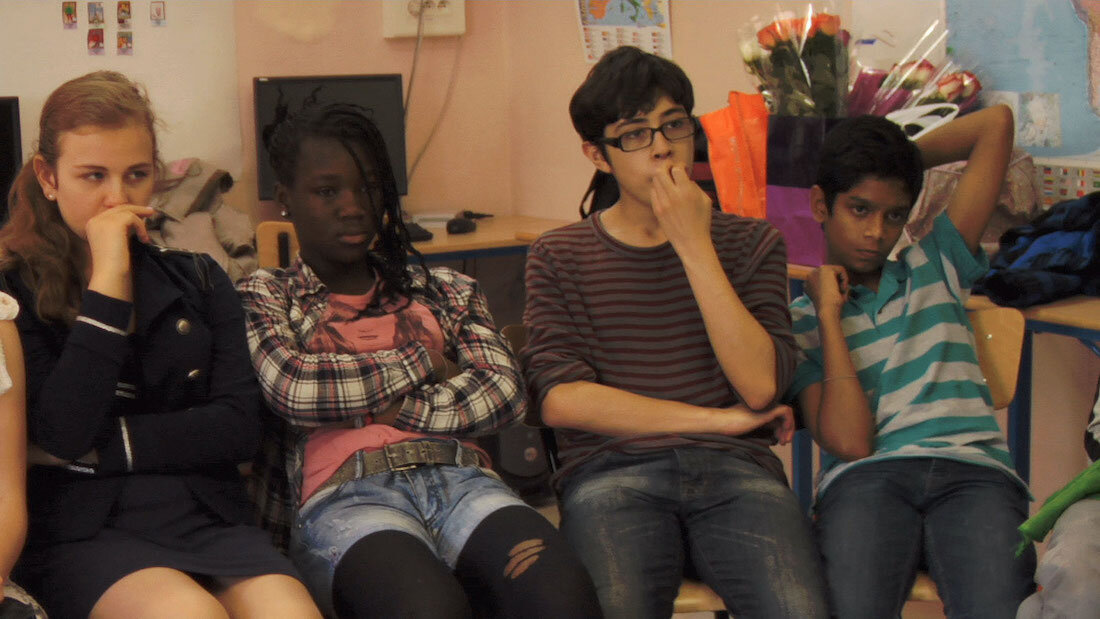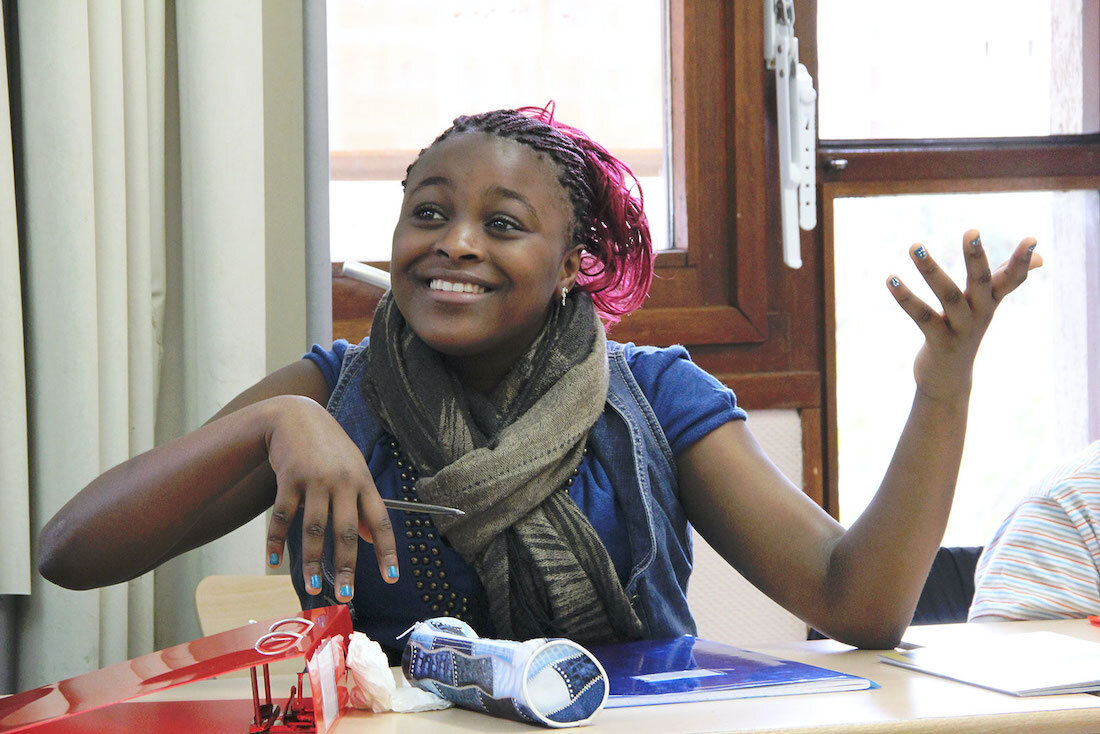Interview with Julie Bertuccelli
We spoke to Julie Bertuccelli at Sheffield Doc/Fest about her film School of Babel. It’s sometimes hilarious, sometimes poignant, but always intelligently observed and profound in its simplicity.
What was it that made you choose this particular school?
First I met the teacher, basically by chance. I had been asked to be on the jury for a school-film festival, and this teacher came with the class from the previous year, because every year she makes a documentary film with her students – a very rich pedagogical project, by the way, making a film. It was thanks to this that I discovered these ‘reception classes’. I immediately wanted to make a film, to spend a year in a class like that, to see the whole world living together. To see close up how it works; the relationships, the discussions, the difficulties for these children who are very mature and have experienced some really hard things in their lives. Afterwards I said to myself ‘next September I’m going to check out all the ‘reception classes’ in Paris and in the suburbs and then decide which one to follow’, and I actually went first to see this teacher because I already had her contact details and it’s close to my house. Then, when I went and saw these new pupils, I was so overcome by their energy and the variety of their nationalities. I also saw that this teacher, as I had suspected, was really fantastic, very engaged, with a magnificent understanding of human relationships. I just said ‘why go anywhere else?!’.
Were you interested in schools, in teaching and learning, before making this film?
Yes! I have three kids, I went to school myself, school has always interested me because – at least the state school in France – it’s a real melting pot, free for everyone, it’s incredible. But I’ve also seen, over the years, things that don’t work, things that should happen but don’t, things that only happen sometimes – like the exceptions that prove the rule, but encouraging nonetheless. Showing this model of a class that functions so well, from which we can draw inspiration for other classes – it’s good to show the positives, but not hide from the negatives either. Just show that it’s possible, that we can transform it.
It’s true that, initially, I didn’t want to make a film about school – my vision was to go and see what it means for newly-arrived immigrants to live together, to show that it is both possible and rich. This richness of immigrants coming to France is really something that needs to be preserved, because integration only works when we take care to welcome people properly. They only have one wish, and that is to be able to integrate, to work, to progress. That was what I wanted to look at initially, but in the end it has become a film with something to say about French state schools – even though this wasn’t my goal.
I want to stay on the subject of schools for a bit – has your opinion on school, on the French education system, changed or evolved because of this film? Particularly in terms of its problems?
My opinion didn’t change because I have known about these problems for a long time, I’ve criticised them for a long time. I have said for ages “it’s crazy, French schools do not take inspiration from what they do well”. We don’t see their successes, and so do not learn from them. That made me mad. Even to look at other countries, to see what they do well. So my opinion on school hasn’t changed – it has been confirmed! – but I now have a real desire to show people that we can do better. Schools can do better, and I want to be positive and show this, give ideas, rather than just criticise.
How many hours did you film with these children?
I can’t really say because I don’t even know myself. We don’t use cassettes any more, so it’s these digital things that only tell us how many megabytes we film. But I went in two or three times a week, so maybe I filmed about one hundred hours.
I filmed lots of outings, other activities…but I didn’t want to show much of that, I just wanted to show the powerful stuff. You always have to keep the best. As soon as you have a strong principle you do better to focus on that and not to spread yourself too thinly looking at peripheral stuff. I didn’t want to do an exhaustive exploration of these ‘reception classes’. I looked for the human story behind what we see, to find the points that we have in common with them, to like them, to understand the difficulties that they face as foreigners, rather than looking to understand how these classes function. It’s true that we see very few grammar classes, things like that…obviously they do lots, and I filmed them from time to time, but I didn’t want to show how they learn French – that would be achingly boring, and not a good film.
The word play in the title, which works really well in French, does not translate into English…
It’s a pity! I don’t think there will be another country where it will work, but maybe there will be different plays on words, maybe around the word ‘tower’, which could have a different sense related to school or community – we’ll see. I haven’t considered the title in every language because I don’t know every language!
I had trouble coming up with the title in the first place. I really only found it a few days before we had to have one for the press notes. I looked around ‘Babel’, but as there was already Iñárritu’s brilliant film Babel, I couldn’t call it that. We put other titles for a long time, ‘Between Two Worlds’ or ‘We Others’, there were quite a few. Finally it was a slip of the tongue – I said ‘I really want to find a title around the school of Babel!’ – I wanted to say ‘tower’. And there you go! [for a bit of context, ‘la tour de Babel’ in French is the tower of Babel, while the original French title ‘La Cour de Babel’ rhymes with this and means ‘class of Babel’].
Do you have a desire to revisit these children in future, maybe like Michael Apted’s Up series?
In France there was a series like that called Qui devindront-ils? [Who Will They Become?], where they filmed a class every year. Definitely, in ten years – I can’t go back every year – I’d like to know what they’ve become, absolutely…but this is the case for all the documentaries that I’ve made. We always want to know what happens to people.
It’s true that for these children especially…maybe this will end up with me travelling all over the world. We’ll see. Why not? I’d really like to. I’m sure that they will grow into passionate people, it would be magnificent to see them all flourish.
Finally, do you have any advice for people who want to make documentaries?
I don’t really have any, apart from to be yourself. It’s true that it isn’t easy. I don’t have a recipe for success. I didn’t do a documentary school myself, I learned on the job. I didn’t want to go to film school – I was very lucky in that my dad was a director, so I got to see up close how it worked – maybe I was afraid of failing the exams of the prestigious schools, I didn’t want to even try. But everything is possible – you can go to the big film schools, or you can learn as an intern and make your mark bit by bit. I needed to feel at home, to start at the bottom and not immediately become a director or screenwriter. For twelve or thirteen years I was an assistant on feature films. I was lucky enough to get to work with Krysztof Kieslowski, Bertrand Tavernier, with Rithy Panh.
Little by little I found my voice. I kept working as an assistant at the start – that’s one piece of advice, you can’t just give up your job at first, because you sometimes wait months for financing.
I made my first film with Les Ateliers Varan in Paris – it isn’t exactly a school, it’s an apprenticeship that lasts three months. You can get funding for it if you are already working. I made my first documentary with them. It’s true that it is very important to have a first ‘calling card’ of a film that you can present at festivals for debut filmmakers. When I saw that my projects were lining up, I stopped working as an assistant – I couldn’t stand to be someone’s assistant any more!
After that, you just have to be yourself. There isn’t one perfect way of making a film, you have to find your own style. The important thing is that you can see yourself in the film, that you call the shots.


